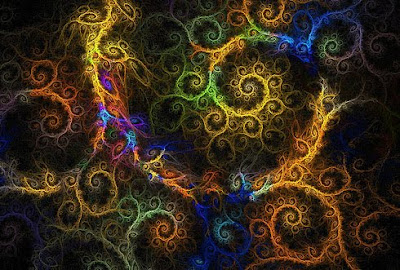Acatalepsia and Ataraxia
This chapter uses "randomness" as a proof. It also uses other proofs, just as unprovable as "randomness" but I'll just concentrate on "randomness". It is good to be skeptical, but that skepticism must be applied to all things, and not only to one in favor of another. One must also be skeptical of science.After all, as I have mentioned before, pi is an abomination of the mind that does not exist. But there are many more things in science that do not exist. In fact, the entire science of geometry does not exist. We have found that there are no such things in nature as a line or a plane. Everything is fractal, and therefore neither a line nor a plane -- but something inbetween. Without lines and planes there are no geometric shapes, only fractal shapes. No Geometry . . . how random is that!?
Don't believe me, read for yourself: Fractal Dimension
Enough of that. Let's talk about randomness.
"When one is dealt a bridge hand of thirteen cards, the probability of being dealt that particular hand is less than one in 600 billion. Still, it would be absurd for someone to be dealt a hand, examine it carefully, calculate that the probability of getting it is less than one in 600 billion, and then conclude that he must not have been dealt that very hand because it is so very improbable." -- John Allen Paulos, Innumeracy: Mathematical Illiteracy and its Consequences
Or, as I say:
"1% is 100% when it happens."
Randomness. What is it? Is it compartmentable? Can it be segregated? Is it distinct, one random bit from another random bit? How infinitesimal is randomness? How huge is randomness? How ordinary is randomness? How extra-ordinary is randomness? Is there no connection anywhere, at any level, between one random bit and another random bit? Is every new second of time a bit of randomness never before seen in exactly that manifestation? How does one calculate randomness? If a thing has a 50% chance of happening -- how is that calculated? Forget coins, what about real life?
A baseball batter with a career of 20 years comes to the plate. Over those 20 years he has gotten a hit 30% of the time (he has a career batting average of .300). Does he have a 30% chance to get a hit? Does he have a 50% chance to get a hit? Does he have some other chance to get a hit? Or is it random -- without any reference at all to anything that has come before or will come after? No connections? None? A totally random chance to get a hit every at bat? Even the tiniest, teeniest bit of a connection utterly dissipates randomness.
Any player of baseball will tell you that each at bat in the player's career is connected in the mind of the batter to the moment at hand, and has an influence over the outcome of the present moment. Further still, each and every previous moment of the pitcher's career is connected in the pitcher's mind to the present moment. And the runner at first base, as well as the first baseman and all the fielders, and the umpires, and the coaches, and the trainers and general managers . . . and on and on. There is a complex web of intricate and ethereal connections that is so interwoven the pattern is hard to see -- and we call that randomness. The present moment is not, nor is it ever, distinct and wholly separate from every other moment. There is no such thing as a random moment, nor is there anything that exists that is random.
Go ahead, name me a random creature. A creature that exists randomly, a creature without any predecessors. Too difficult? OK, how about a random word. Tell me a random word, any word, a word not connected to any other words through thought or utterance or ink, a word that is a thought in and of itself and has random definitions each time it randomly appears in random conversations with random people on a random world in a random universe.
Randominity demands randomness at every level or it is not random. Can there be such a thing as a random anything? Or is randomness just another pipe dream like circles, triangles and squares?
Absurd? Yes. OK, how about flipping a coin? Can a coin flip be random? Or is it influenced by the muscles of the hand that flips it and the molecules of air that surround it? Make a machine to flip the coin, and the machine will wear out a little with every flip thus creating a building influence from the first flip to the last flip -- none being random.
Computers? Random number generating programs? Don't wear out, simply electrons . . . Funny thing, that. Computers cannot generate random numbers. There is always a pattern. A repeatable pattern. Programs that generate random numbers all fudge it, trying for enough of a complicated pattern that it appears random -- but it never is. Computers, those things that think in either-or, on or off, zero or one . . . those things that are utterly without deception, they say randomness is simply impossible.
If a moment cannot be random, what then can we say about randomness? How can randomness exist when there is no environment for it to survive within?
I found the skepticism of this chapter misplaced, vindictive, childish, and not at all random. Skeptics assert nothing, announcing only opinion. The protagonists in this chapter are not skeptics, they are zealots of cause.









